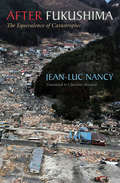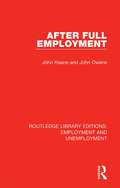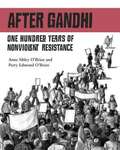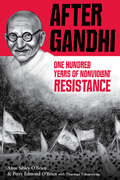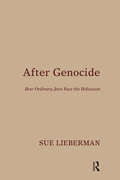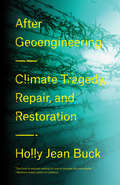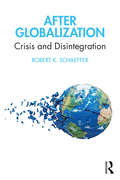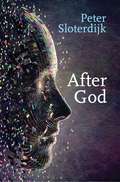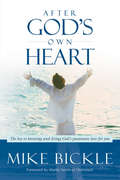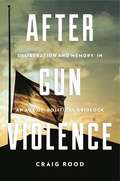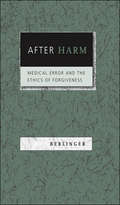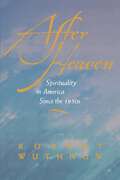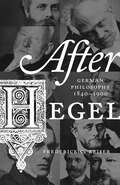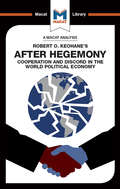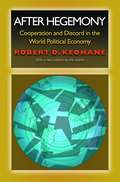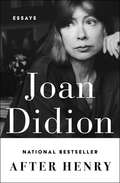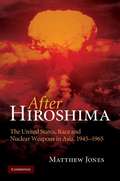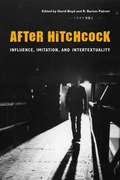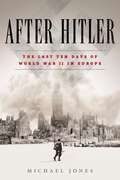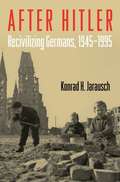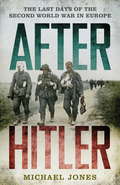- Table View
- List View
After Fukushima: The Equivalence of Catastrophes
by Jean-Luc NancyThe renowned philosopher offers &“a powerful reflection on our times . . . and the fate of our civilization, as revealed by the catastrophe of Fukushima&” (François Raffoul, Louisiana State University). In 2011, a tsunami flooded Japan&’s Fukushima Daiichi Nuclear Power Plant, causing three nuclear meltdowns, the effects of which will spread through generations and have an impact on all living things. In After Fukushima, philosopher Jean-Luc Nancy examines the nature of catastrophes in the era of globalization and technology. He argues that in today&’s interconnected world, the effects of any disaster will spread in the way we currently associate only with nuclear risk. Can a catastrophe be an isolated occurrence? Is there such a thing as a &“natural&” catastrophe when all of our technologies—nuclear energy, power supply, water supply—are necessarily implicated, drawing together the biological, social, economic, and political? In this provocative and engaging work, Nancy examines these questions and more. Exclusive to this English edition are two interviews with Nancy conducted by Danielle Cohen-Levinas and Yuji Nishiyama and Yotetsu Tonaki.
After Full Employment (Routledge Library Editions: Employment and Unemployment #4)
by John Keane John OwensFirst published in 1986. This book analyses, at an introductory level, the four main and competing political interpretations of the cause of unemployment and the future of paid work – social democracy, free market liberalism, the disciplinary state, and utopian socialism. Considered together these four interpretations are highly revealing – and challenging. They raise considerable doubts about the viability or desirability of policies design to ‘get the jobless back to work’. Keane and Owens’ central argument is that the post-war policy of full male employment, as well as its politic, economic and social preconditions, are not repeatable, Starting with Keynes and Beveridge, they explain how and why full employment welfare states developed in Britain and the US, and how they had in turn been replaced by the ‘strong state, free market’ programmes of Thatcher and Reagan. By focusing on an issue which was, and still is, at the heart of political debate, the book provides a lucid and approachable guide to four key strands of political thought it Britain and the US. It will be an ideal introductory text for students of politics, sociology and economics.
After Gandhi: One Hundred Years of Nonviolent Resistance
by Anne Sibley O'Brien Perry Edmond O'BrienThis book explores the work of Mohandas Gandhi and his legacy through fifteen profiles of activists who chose nonviolent resistance as the path to change. The book focuses on heroic individuals who were in direct physical danger and chose to respond with nonviolence.
After Gandhi: One Hundred Years of Nonviolent Resistance
by Anne Sibley O'BrienIn 1908 Mohandas Gandhi spoke to a crowd of 3,000. Together they protested against an unjust law without guns or rioting. Peacefully they made a difference. Gandhi’s words and deeds influenced countless others to work toward the goals of freedom and justice through peaceful methods. Mother and son team, Anne Sibley O’Brien and Perry Edmond O’Brien, highlight some of the people and events that Gandhi’s actions inspired. From Rosa Parks to the students at Tiananmen Square to Wangari Maathai, these people have made the world sit up and take notice. The provocative graphics and beautiful portraits accompanying these stories stir the emotions and inspire a sense of civic responsibility.
After Genocide: How Ordinary Jews Face the Holocaust
by Sue Lieberman2015 was the seventieth anniversary of the end of World War Two, and, for Jews, the seventieth anniversary of the end of the worst Jewish catastrophe in diaspora history. After Genocide considers how, more than two generations since the war, the events of the Holocaust continue to haunt Jewish people and the worldwide Jewish population, even where there was no immediate family connection. Drawing from interviews with "ordinary" Jews from across the age spectrum, After Genocide focuses on the complex psychological legacy of the Holocaust. Is it, as many think, a "collective trauma"? How is a community detached in space and time traumatised by an event which neither they nor their immediate ancestors experienced?"Ordinary" Jews' own words bring to life a narrative which looks at how commonly-recognised attributes of trauma - loss, anger, fear, guilt, shame - are integral to Jewish reactions to the Holocaust.
After Geoengineering: Climate Tragedy, Repair, and Restoration
by Holly Jean BuckWhat if the people seized the means of climate production?Climate engineering is a dystopian project. But as the human species hurtles ever faster towards its own extinction, geoengineering as a temporary fix, to buy time for carbon removal, is a seductive idea. We are right to fear that geoengineering will be used to maintain the status quo, but is there another possible future after geoengineering? Can these technologies and practices be used as technologies of repair, to bring carbon levels back down to pre-industrial levels? Are there possibilities for massive intentional intervention in the climate that are democratic, decentralized, or participatory? Is there a scenario where the people can define and enact geoengineering on our own terms? These questions are provocative, because they go against a binary that has become common sense: geoengineering is assumed to be on the side of industrial agriculture, inequality and ecomodernism, in opposition to degrowth, renewable energy, sustainable agriculture and climate justice. After Geoengineering rejects this binary, to ask: what if the people seized the means of climate production? Both critical and utopian, the book examines the possible futures after geoengineering. Rejecting the idea that geoengineering is some kind of easy work-around, Holly Buck outlines the kind of social transformation that would be necessary to enact a programme of geoengineering in the first place.
After Globalization: Crisis and Disintegration
by Robert K. SchaefferIn the 1980s, U.S. officials adopted tax and monetary policies that channeled huge new resources into Wall Street, which fueled a stock market boom. To increase profits and payouts to investors as stock prices soared, corporate managers consolidated businesses, outsourced manufacturing to low-wage countries, and adopted new technologies to increase productivity. Government officials then facilitated mergers and negotiated free trade agreements to speed the process of globalization. Wall Street became an engine of capital accumulation and a force for global change.These developments resulted in massive job losses and stagnant wages for most Americans. Meanwhile, tax cuts and the stock market boom created vast new wealth for the rich, and the top 10 percent seized 50 percent of all income in the United States. The result was growing economic inequality.During the decades that followed, globalization triggered regional economic crises, toppled governments, transformed societies, galvanized economic development in China, and created new forms of wealth and inequality around the world. Then in 2008, a financial crisis rooted in Wall Street triggered the Great Recession, wrecked the legitimacy of globalization as a development strategy, and unleashed populist or "restrictionist" social movements and political parties that challenged globalization and attacked its economic and political foundations.This book examines the origins of globalization in the 1980s, the developments that triggered the Great Recession, and the political and economic forces that contributed to the disintegration of globalization as a force for change in the modern world. After Globalization explains what happened—and what comes next.
After God
by Peter SloterdijkIn his Critique of Cynical Reason, Peter Sloterdijk pursued an enlightenment of the Enlightenment in both its beginnings and the present. After God is dedicated to the theological enlightenment of theology. It ranges from the period when gods reigned, through the rule of the world-creator god to reveries about the godlike power of artificial intelligence. The path of this self-enlightening theology, which is carried out here by a non-theologian, must begin well before Nietzsche’s declaration of the death of God, and it must move beyond this dictum to explore the present and the future. Since the early 20th century we have seen how the metaphysical twilight of the gods, which has preoccupied philosophers and theologians, has been accompanied by an earthly twilight of the souls. The emergence of psychoanalysis, and more recently the development of the neuro-cognitive sciences, have secularized the old Indo-European concept of the soul and transferred many accomplishments of the human mind to computerized machines. What remains of the eternal light of the soul after the artificial lights have been turned on? Have the inventors of AI thrust themselves into the position vacated by the death of god? Perhaps the distinction between God and idols will soon re-emerge here for the citizens of modernity, only this time in a technological and political register. For them, theological enlightenment – which is completely different from an instinctive rejection of religion – will be a fateful task. This new work by one of the most original thinkers today will appeal to students and scholars across the humanities and social sciences, as well as anyone interested in religion, philosophy and critical theory today.
After God's Own Heart: The Key to Knowing and Living God's Passionate Love for You
by Mike BickleImagine what David felt like to be singled out and given an almost unfathomable spiritual identity…to seen by God as “a man after His own heart.” David's secret is that he was energized by intimacy with God as a student of God's emotions. He encountered the power of God's emotions. It transformed his emotions for God. You can also become a student of God’s emotions and experience being energized by the Holy Spirit to a life of deep obedience and mature love. Invest time in understanding the emotions found in God’s heart for you, and your own heart will experience a glorious awakening.
After Greenwashing
by Frances BowenBusinesses promote their environmental awareness through green buildings, eco-labels, sustainability reports, industry pledges and clean technologies. When are these symbols wasteful corporate spin, and when do they signal authentic environmental improvements? Based on twenty years of research, three rich case studies, a strong theoretical model and a range of practical applications, this book provides the first systematic analysis of the drivers and consequences of symbolic corporate environmentalism. It addresses the indirect cost of companies' symbolic actions and develops a new concept of the 'social energy penalty' - the cost to society when powerful corporate actors limit the social conversation on environmental problems and their solutions. This thoughtful book develops a set of tools for researchers, regulators and managers to separate useful environmental information from empty corporate spin, and will appeal to researchers and students of corporate responsibility, corporate environmental strategy and sustainable business, as well as environmental practitioners.
After Gun Violence: Deliberation and Memory in an Age of Political Gridlock (Rhetoric and Democratic Deliberation #21)
by Craig RoodMass shootings have become the “new normal” in American life. The same can be said for the public debate that follows a shooting: blame is cast, political postures are assumed, but no meaningful policy changes are enacted. In After Gun Violence, Craig Rood argues that this cycle is the result of a communication problem. Without advocating for specific policies, Rood examines how Americans talk about gun violence and suggests how we might discuss the issues more productively and move beyond our current, tragic impasse.Exploring the ways advocacy groups, community leaders, politicians, and everyday citizens talk about gun violence, Rood reveals how the gun debate is about far more than just guns. He details the role of public memory in shaping the discourse, showing how memories of the victims of gun violence, the Second Amendment, and race relations influence how gun policy is discussed. In doing so, Rood argues that forgetting and misremembering this history leads interest groups and public officials to entrenched positions and political failure and drives the public further apart.Timely and innovative, After Gun Violence advances our understanding of public discourse in an age of gridlock by illustrating how public deliberation and public memory shape and misshape one another. It is a search to understand why public discourse fails and how we can do better.
After Gun Violence: Deliberation and Memory in an Age of Political Gridlock (Rhetoric and Democratic Deliberation)
by Craig RoodMass shootings have become the “new normal” in American life. The same can be said for the public debate that follows a shooting: blame is cast, political postures are assumed, but no meaningful policy changes are enacted. In After Gun Violence, Craig Rood argues that this cycle is the result of a communication problem. Without advocating for specific policies, Rood examines how Americans talk about gun violence and suggests how we might discuss the issues more productively and move beyond our current, tragic impasse.Exploring the ways advocacy groups, community leaders, politicians, and everyday citizens talk about gun violence, Rood reveals how the gun debate is about far more than just guns. He details the role of public memory in shaping the discourse, showing how memories of the victims of gun violence, the Second Amendment, and race relations influence how gun policy is discussed. In doing so, Rood argues that forgetting and misremembering this history leads interest groups and public officials to entrenched positions and political failure and drives the public further apart.Timely and innovative, After Gun Violence advances our understanding of public discourse in an age of gridlock by illustrating how public deliberation and public memory shape and misshape one another. It is a search to understand why public discourse fails and how we can do better.
After Harm: Medical Error and the Ethics of Forgiveness
by Nancy BerlingerMedical error is a leading problem of health care in the United States. Each year, more patients die as a result of medical mistakes than are killed by motor vehicle accidents, breast cancer, or AIDS. While most government and regulatory efforts are directed toward reducing and preventing errors, the actions that should follow the injury or death of a patient are still hotly debated. According to Nancy Berlinger, conversations on patient safety are missing several important components: religious voices, traditions, and models. In After Harm, Berlinger draws on sources in theology, ethics, religion, and culture to create a practical and comprehensive approach to addressing the needs of patients, families, and clinicians affected by medical error. She emphasizes the importance of acknowledging fallibility, telling the truth, confronting feelings of guilt and shame, and providing just compensation. After Harm adds important human dimensions to an issue that has profound consequences for patients and health care providers.
After Heaven: Spirituality in America Since the 1950s
by Robert WuthnowThe evolution of American spirituality over the past fifty years is the subject of Robert Wuthnow's engrossing new book. Wuthnow uses in-depth interviews and a broad range of resource materials to show how Americans, from teenagers to senior citizens, define their spiritual journeys. His findings are a telling reflection of the changes in beliefs and lifestyles that have occurred throughout the United States in recent decades.Wuthnow reconstructs the social and cultural reasons for an emphasis on a spirituality of dwelling (houses of worship, denominations, neighborhoods) during the 1950s. Then in the 1960s a spirituality of seeking began to emerge, leading individuals to go beyond established religious institutions. In subsequent chapters Wuthnow examines attempts to reassert spiritual discipline, encounters with the sacred (such as angels and near-death experiences), and the development of the "inner self." His final chapter discusses a spirituality of practice, an alternative for people who are uncomfortable within a single religious community and who want more than a spirituality of endless seeking.The diversity of contemporary American spirituality comes through in the voices of the interviewees. Christians, Jews, Buddhists, Muslims, Hindus, and Native Americans are included, as are followers of occult practices, New Age religions, and other eclectic groups. Wuthnow also notes how politicized spirituality, evangelical movements, and resources such as Twelve-Step programs and mental health therapy influence definitions of religious life today.Wuthnow's landmark book, The Restructuring of American Religion (1988), documented the changes in institutional religion in the United States; now After Heaven explains the changes in personal spirituality that have come to shape our religious life. Moreover, it is a compelling and insightful guide to understanding American culture at century's end.
After Hegel: German Philosophy, 1840–1900
by Frederick C. BeiserHistories of German philosophy in the nineteenth century typically focus on its first half—when Hegel, idealism, and Romanticism dominated. By contrast, the remainder of the century, after Hegel's death, has been relatively neglected because it has been seen as a period of stagnation and decline. But Frederick Beiser argues that the second half of the century was in fact one of the most revolutionary periods in modern philosophy because the nature of philosophy itself was up for grabs and the very absence of certainty led to creativity and the start of a new era. In this innovative concise history of German philosophy from 1840 to 1900, Beiser focuses not on themes or individual thinkers but rather on the period’s five great debates: the identity crisis of philosophy, the materialism controversy, the methods and limits of history, the pessimism controversy, and the Ignorabimusstreit. Schopenhauer and Wilhelm Dilthey play important roles in these controversies but so do many neglected figures, including Ludwig Büchner, Eugen Dühring, Eduard von Hartmann, Julius Fraunstaedt, Hermann Lotze, Adolf Trendelenburg, and two women, Agnes Taubert and Olga Pluemacher, who have been completely forgotten in histories of philosophy. The result is a wide-ranging, original, and surprising new account of German philosophy in the critical period between Hegel and the twentieth century.
After Hegemony
by Ramon Pacheco PardoRobert O. Keohane’s After Hegemony is both a classic of international relations scholarship and an example of how creative thinking can help shed new light on the world. Since the end of World War II, the global political landscape had been dominated by two superpowers, the USA and the USSR, and the tense stand-off of the Cold War. But, as the Cold War began to thaw, it became clear that a new global model might emerge. The commonly held belief amongst those studying international relations was that it was impossible for nations to work together without the influence of a hegemon (a dominant international power) to act as both referee and ultimate decision-maker. This paradigm – neorealism – worked on the basis that every nation will do all it can to maximize its power, with such processes only checked by a balance of competing powers. Keohane, however, examined the evidence afresh and came up with novel explanations for what was likely to come next. He went outside the dominant paradigm, and argued for what came to be known as the neoliberal conception of international politics. States, Keohane said, can and will cooperate without the influence of a hegemonic power, so long as doing so brings them absolute gains in the shape of economic and cultural benefits. In Keohane’s highly-creative view, the pursuit of national self-interest leads naturally to international cooperation – and to the formation of global regimes (such as the United Nations) that can reinforce and foster it.
After Hegemony: Cooperation and Discord in the World Political Economy
by Robert O. KeohaneThis book is a comprehensive study of cooperation among the advanced capitalist countries. Can cooperation persist without the dominance of a single power, such as the United States after World War II? To answer this pressing question, Robert Keohane analyzes the institutions, or "international regimes," through which cooperation has taken place in the world political economy and describes the evolution of these regimes as American hegemony has eroded. Refuting the idea that the decline of hegemony makes cooperation impossible, he views international regimes not as weak substitutes for world government but as devices for facilitating decentralized cooperation among egoistic actors. In the preface the author addresses the issue of cooperation after the end of the Soviet empire and with the renewed dominance of the United States, in security matters, as well as recent scholarship on cooperation.
After Henry: Essays
by Joan DidionIncisive essays on Patty Hearst and Reagan, the Central Park jogger and the Santa Ana winds, from the New York Times–bestselling author of South and West. In these eleven essays covering the national scene from Washington, DC; California; and New York, the acclaimed author of Slouching Towards Bethlehem and The White Album &“capture[s] the mood of America&” and confirms her reputation as one of our sharpest and most trustworthy cultural observers (The New York Times). Whether dissecting the 1988 presidential campaign, exploring the commercialization of a Hollywood murder, or reporting on the &“sideshows&” of foreign wars, Joan Didion proves that she is one of the premier essayists of the twentieth century, &“an articulate witness to the most stubborn and intractable truths of our time&” (Joyce Carol Oates, The New York Times Book Review). Highlights include &“In the Realm of the Fisher King,&” a portrait of the White House under the stewardship of Ronald and Nancy Reagan, two &“actors on location;&” and &“Girl of the Golden West,&” a meditation on the Patty Hearst case that draws an unexpected and insightful parallel between the kidnapped heiress and the emigrants who settled California. &“Sentimental Journeys&” is a deeply felt study of New York media coverage of the brutal rape of a white investment banker in Central Park, a notorious crime that exposed the city&’s racial and class fault lines. Dedicated to Henry Robbins, Didion&’s friend and editor from 1966 until his death in 1979, After Henry is an indispensable collection of &“superior reporting and criticism&” from a writer on whom we have relied for more than fifty years &“to get the story straight&” (Los Angeles Times).
After Hiroshima
by Matthew JonesBy emphasising the role of nuclear issues, After Hiroshima provides a new history of American policy in Asia between the dropping of the atomic bombs on Japan and the escalation of the Vietnam War. Drawing on a wide range of documentary evidence, Matthew Jones charts the development of American nuclear strategy and the foreign policy problems it raised, as the United States both confronted China and attempted to win the friendship of an Asia emerging from colonial domination. In underlining American perceptions that Asian peoples saw the possible repeat use of nuclear weapons as a manifestation of Western attitudes of 'white superiority', he offers new insights into the links between racial sensitivities and the conduct of US policy, and a fresh interpretation of the transition in American strategy from massive retaliation to flexible response in the era spanned by the Korean and Vietnam Wars.
After Hitchcock: Influence, Imitation, and Intertextuality
by Palmer David Boyd R. BartonAlfred Hitchcock is arguably the most famous director to have ever made a film. Almost single-handedly he turned the suspense thriller into one of the most popular film genres of all time, while his Psycho updated the horror film and inspired two generations of directors to imitate and adapt this most Hitchcockian of movies. Yet while much scholarly and popular attention has focused on the director's oeuvre, until now there has been no extensive study of how Alfred Hitchcock's films and methods have affected and transformed the history of the film medium. In this book, thirteen original essays by leading film scholars reveal the richness and variety of Alfred Hitchcock's legacy as they trace his shaping influence on particular films, filmmakers, genres, and even on film criticism. Some essays concentrate on films that imitate Hitchcock in diverse ways, including the movies of Brian de Palma and thrillers such as True Lies, The Silence of the Lambs, and Dead Again. Other essays look at genres that have been influenced by Hitchcock's work, including the 1970s paranoid thriller, the Italian giallo film, and the post-Psycho horror film. The remaining essays investigate developments within film culture and academic film study, including the enthusiasm of French New Wave filmmakers for Hitchcock's work, his influence on the filmic representation of violence in the post-studio Hollywood era, and the ways in which his films have become central texts for film theorists.
After Hitler
by Michael JonesFrom the acclaimed author of The King's Mother and Bosworth 1485--a fascinating look at ten days that changed the course of history...With the world at war, ten days can feel like a lifetime.... On April 30, 1945, Adolf Hitler committed suicide in a bunker in Berlin. But victory over the Nazi regime was not celebrated in western Europe until May 8, and in Russia a day later, on the ninth. Why did a peace agreement take so much time? How did this brutal, protracted conflict coalesce into its unlikely endgame? After Hitler shines a light on ten fascinating days after that infamous suicide that changed the course of the twentieth century. Combining exhaustive research with masterfully paced storytelling, Michael Jones recounts the Führer's frantic last stand; the devious maneuverings of his handpicked successor, Karl Dönitz; the grudging respect Joseph Stalin had for Churchill and FDR, as well as his distrust of Harry Truman; the bold negotiating by General Dwight D. Eisenhower that hastened Germany's surrender but drew the ire of the Kremlin; the journalist who almost scuttled the cease-fire; and the thousands of ordinary British, American, and Russian soldiers caught in the swells of history, from the Red Army's march on Berlin to the liberation of the Nazis' remaining concentration camps. Through it all, Jones traces the shifting loyalties between East and West that sowed the seeds of the Cold War and nearly unraveled the Grand Alliance. In this gripping, eloquent, and even-handed narrative, the spring of 1945 comes alive--a fascinating time when nothing was certain, and every second mattered....INCLUDES PHOTOSFrom the Hardcover edition.
After Hitler: Recivilizing Germans, 1945-1995
by Konrad H. Jarausch Konrad HunzikerIn the spring of 1945, as the German army fell in defeat and the world first learned of the unspeakable crimes of the Holocaust, few would have expected that, only half a century later, the Germans would emerge as a prosperous people at the forefront of peaceful European integration. How did the Germans manage to recover from the shattering experience of defeat in World War II and rehabilitate themselves from the shame and horror of the Holocaust? In After Hitler, Konrad H. Jarausch shows how Germany's determination to emphasize civility and civil society, destroyed by the Nazi regime,helped restore the demoralized nation during the post-war period. Unlike other intellectual inquiries into German efforts to deal with the Nazi past, After Hitler primarily focuses on the practical lessons a disoriented people drew from their past misdeeds, and their struggle to create a new society with a sincere and deep commitment to human rights. After Hitler offers a comprehensive view of the breathtaking transformation of the Germans from the defeated Nazi accomplices and Holocaust perpetrators of 1945 to the civilized, democratic people of today's Germany.
After Hitler: The Last Days of the Second World War in Europe
by Michael JonesOn 30 April 1945, Adolf Hitler committed suicide. The following day, his propaganda minister Joseph Goebbels also killed himself and the crumbling Third Reich passed to Admiral Karl Dönitz. The Nazis' position seemed hopeless. Yet remarkably, the war in the rest of Europe went on for another ten days. After Hitler looks at these days as a narrative day-by-day countdown but also as a broader global history of a European war that had seen some of the most savage battles in history. Relations between the 'Big Three' - the United States, Great Britain and the Soviet Union - suddenly plunged to near breaking point. This book reveals that tumultuous story.After Hitler also looks at the wider canvas of the war and the terrible humanitarian catastrophe uncovered in Europe. It describes those who felt the joy of freedom, but also those who faced a highly uncertain future. As Red Army soldiers joined forces with their British and American allies, Stalin's East finally came face to face with Churchill's and Truman's West. After Hitler tells of their growing mistrust, but also of moments of remarkable goodwill and co-operation - the brief but poignant hope that these great nations could together fashion a new and safer future. This is a fascinating exploration of the brief but crucial period that shaped the emerging post-war world.
After Hitler: The Last Days of the Second World War in Europe
by Michael JonesOn 30 April 1945, Adolf Hitler committed suicide. The following day, his propaganda minister Joseph Goebbels also killed himself and the crumbling Third Reich passed to Admiral Karl Dönitz. The Nazis' position seemed hopeless. Yet remarkably, the war in the rest of Europe went on for another ten days. After Hitler looks at these days as a narrative day-by-day countdown but also as a broader global history of a European war that had seen some of the most savage battles in history. Relations between the 'Big Three' - the United States, Great Britain and the Soviet Union - suddenly plunged to near breaking point. This book reveals that tumultuous story.After Hitler also looks at the wider canvas of the war and the terrible humanitarian catastrophe uncovered in Europe. It describes those who felt the joy of freedom, but also those who faced a highly uncertain future. As Red Army soldiers joined forces with their British and American allies, Stalin's East finally came face to face with Churchill's and Truman's West. After Hitler tells of their growing mistrust, but also of moments of remarkable goodwill and co-operation - the brief but poignant hope that these great nations could together fashion a new and safer future. This is a fascinating exploration of the brief but crucial period that shaped the emerging post-war world.
